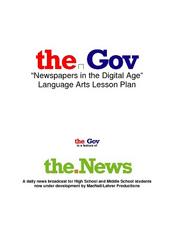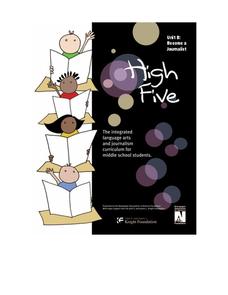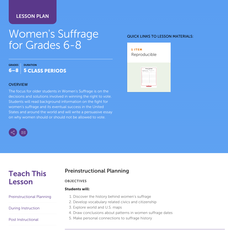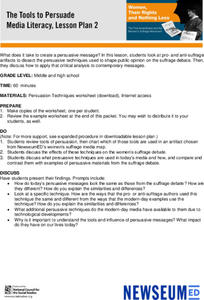Curated OER
Symbolic Speech
Ninth graders consider the right of freedom of speech as it is outlined in the U.S. Constitution. They receive background information for the US Supreme Court, the Bill of Rights, and free speech. They discuss a series of actual cases...
Curated OER
Newspapers in the Digital Age
Is journalism more or less reliable with the influx of Internet sources? Learners investigate the issues of freedom of speech, journalistic ethics, and social responsibility in the age of Twitter and Facebook. After examining the...
My Access
“Banning Books” Lesson Plan
To Kill a Mockingbird, Hunger Games, Brave New World. Welcome to Banned Books Week. As part of a study of censorship and book banning, class members investigate censorship, the purposes of censorship, and First Amendment rights,...
Online Publications
Become a Journalist
Explore the newspaper as a unique entity with a detailed and extended unit. The unit requires learners to consider the newspaper's role in democracy, think about ethics, practice writing and interviewing, and examine advertising and news...
Scholastic
Women's Suffrage for Grades 6–8
Learners study the decisions and solutions involved in winning the right to vote. After reading background information on the fight for women's suffrage, including one woman's story, and its eventual success in the United States and...
Administrative Office of the US Courts
Snyder v. Phelps
Does the Westboro Baptist Church have the protection of the Constitution when protesting military funerals? High schoolers examine the 2011 Supreme Court case of Snyder v. Phelps before comparing the situation to a fictional scenario of...
K20 LEARN
Oklahoma and Segregation
It was not just the states of the Deep South that practiced segregation. Young historians investigate the history of segregation and desegregation in Oklahoma. They begin by reading, annotating, and analyzing an article about the impacts...
Carolina K-12
African Americans in the United States Congress During Reconstruction
The Civil Rights Act of 1866, which granted citizenship to all males in the U.S., resulted in the first African Americans to be elected to Congress. Class members research 11 of these men, the challenges they faced, and craft...
PBS
Constitution Day
Travel back to 1787 as young scholars investigate the creation of the US Constitution. After first working in small groups to create sets of classroom rules, students go on to read a summary of the Constitution and watch a short video...
Benjamin Franklin Tercentenary
Franklin’s Fair Hand American Journalism
Scholars know him for his role in the American Revolution, but Ben Franklin was also a journalist and printer. Learners investigate his standards for what was fit to print using primary sources—including writings where Franklin explains...
PBS
History of Juneteenth and Why It’s Now a National Holiday
June 19 is now a United States federal holiday. Young historians examine the background of the first Juneteenth celebrations and why on June 15, 2021, Congress finally approved "Juneteenth National Independence Day" as a federal holiday.
National Constitution Center
Born in the U.S.A: Music as Political Protest
Though often used in shows of patriotism, Bruce Springsteen's 1985 song "Born in the U.S.A." is critical of America's role in the Vietnam war and its treatment of American veterans. High schoolers analyze the song's lyrics in an activity...
Center for Civic Education
Constitution Day Rap
Engage your class while learning about the US Constitution with this fun primary grade social studies lesson. After viewing a picture of the US Constitution, young learners piece together a US flag using stars and stripes with facts...
National Endowment for the Humanities
A Day for the Constitution
The "Constitution Day and Citizenship Day" law requires schools receiving any federal funding to provide educational programming on the history of the American Constitution. The lesson plans, materials, videos, questions, and activities...
Teaching Tolerance
Journalism for Justice
Roll the presses! Or at least have your class members participate in the time-honored tradition of the student press by creating their own newspapers or journalist pieces on a social problem. After conducting research and collaborating...
PBS
Civic Engagement and How Students Can Get Involved
There is no age limit on civic engagement. Even if your pupils are not old enough to vote, they are old enough to get involved. Show them how with a PBS lesson that underscores the importance of civic participation and models ways young...
Facing History and Ourselves
Free Press Makes Democracy Work
A unit study of the importance of a free press in a democracy begins with class members listening to a podcast featuring two journalists, one from a United States public radio station and one from Capetown, South Africa. The lesson,...
Newseum
The Tools to Persuade
After reviewing persuasion techniques, young historians examine how a specific technique was used in the pro- or anti-suffrage messages. They then examine how that same technique is used in modern-day media messages.
Newseum
Civil Rights: Chronicling the Movement
Scholars investigate events in the civil rights era in their community and develop a multimedia presentation of their findings. They compare local events with national events discussed on a NewseumED timeline.
Newseum
'The Press and the Civil Rights Movement' Video Lesson
Scholars watch a video featuring journalists who covered the civil rights movement, then respond to questions on a viewing guide. The video features interviews with participants and original news footage from the 1950s and 1960s. In...
Newseum
From the Front Page to the History Books
Young journalists compare news coverage of four major events with how the same events are covered in historical accounts. The ensuing discussion asks class members to compare and contrast the role of a reporter and the role of a historian.
Newseum
Is This Story Share-Worthy?
Young journalists use a "Is This Story Share-Worthy?" flowchart graphic to decide whether a story is worth sharing online. Instructors provide groups with fake news, poor quality stories, opinion pieces, biased news, and high-quality...
Newseum
Civil Rights: Turning Points
As part of a civil rights movement study, groups select an event from an interactive timeline that they feel marks a turning point in the struggle. After collecting evidence to support their choice, the teams develop a multimedia...
Newseum
Free Press Challenges Through History: Analyzing Historical Sources
The debate over the integrity of stories in media is not new. Young journalists analyze historical sources that reveal freedom of the press controversies and draw parallels to challenges freedom of the press faces today.
Other popular searches
- First Amendment Debate
- First Amendment Court Cases
- First Amendment Rights
- First Amendment and Schools
- The First Amendment
- Reading First Amendment
- First Amendment and Students
- Free Speech First Amendment
- First Amendment Outline
- Powerpoint First Amendment
- Free Speech +First Amendment
- First Amendment Journalists

























